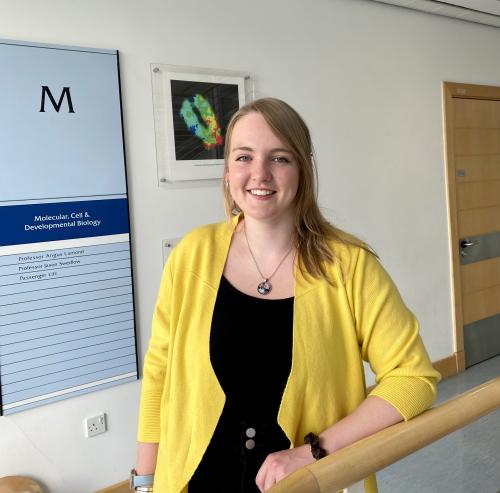
In a new discovery, scientists from the Sapkota lab, in collaboration with a team of clinicians led by Dr. Amaia Lasa-Aranzasti at Vall d'Hebron University Hospital in Barcelona, have uncovered how a novel a genetic mutation is responsible for causing a rare skin disorder known as palmoplantar keratoderma (PPK).
PPK is a rare skin condition that causes thick skin on the palms and soles, often leading to painful abrasions. Other symptoms include sparse hair, long eyelashes, and poor dental enamel.
The study, conducted by PhD student Lorraine Glennie from the Sapkota lab in Dundee and a team of clinicians at Vall d'Hebron University Hospital in Barcelona, focused on a 60-year-old female patient who has lived with PPK. The team discovered that the patient had a novel mutation in the FAM83G gene.
Work from the Sapkota lab in Dundee had previously established that the key role of FAM83G is to enable cellular signalling cascade through an interaction with a vital enzyme called CK1. This interaction is essential for activating WNT signalling cascade, which is important for cell division and fate.
The research team discovered that the newly identified mutation in the FAM83G gene disrupts its interaction with CK1, leading to reduced WNT signalling, thereby contributing to the progression of PPK. These findings were verified in patient-derived skin cells.
These findings suggest that the disruption in the WNT signalling pathway likely underlies the tissue abnormalities seen in PPK patients, and therefore open new avenues for drug discovery research aimed at developing potential treatments.
Dr. Lasa-Aranzasti, who led the clinical study, said, “understanding the underlying molecular mechanisms of pathology is important for patients and clinicians alike.” She added, “when we discovered the new FAM83G mutation, we contacted Dr. Sapkota in Dundee for its molecular characterisation. We are grateful to the patients for participating in this study and for donating samples.”
Prof. Sapkota, who led the study in Dundee, said, “This has been a tremendous collaboration between our lab and the clinical team at Vall d'Hebron University Hospital in Barcelona. Working with clinicians caring for patients with rare but unexplained disorders and being able to establish the link between a novel genetic mutation and the underlying pathology is extremely satisfying.” He added, “we are continuing our work on the role of FAM83G in WNT signalling and hope to discover interventions that might be useful not just for PPK, but also in colorectal cancers that are primarily driven by hyperactive WNT signalling.”
Marta Codina Solà, Mar Xunclà, Gloria Aparicio Español, Elena Garcia-Arumí and Eduardo Fidel Tizzano from Barcelona and Nicola Wood and Thomas J. Macartney from Dundee also contributed to the study.
The findings from this study have now been published in Open Biology and can be found here

